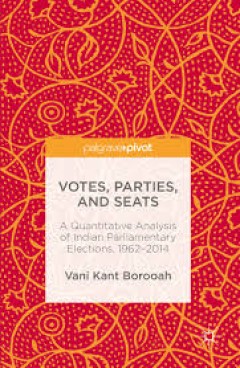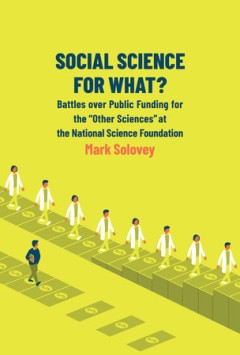Filter by

The divide :how fanatical certitude is destroying democracy
"A highly readable and punchy roadmap that ordinary citizens and policymakers alike can use to begin rethinking and refashioning their political interactions to be more productive"--OCLC-licensed vendor bibliographic record.
- Edition
- -
- ISBN/ISSN
- 0262365995
- Collation
- 1 online resource.
- Series Title
- -
- Call Number
- -

Trump and the media
The election of Donald Trump and the great disruption in the news and social media.OCLC-licensed vendor bibliographic record.
- Edition
- -
- ISBN/ISSN
- 9780262346610
- Collation
- 1 online resource (x, 257 pages)
- Series Title
- -
- Call Number
- -

Reluctant power :networks, corporations, and the struggle for global governan…
OCLC-licensed vendor bibliographic record.
- Edition
- -
- ISBN/ISSN
- 9780262353748
- Collation
- 1 online resource (392 pages).
- Series Title
- -
- Call Number
- -

Digital suffragists :women, the web, and the future of democracy
"The book considers the rates and conditions of women's participation in the public sphere and explores the implications for politics, democracy, and society"--OCLC-licensed vendor bibliographic record.
- Edition
- -
- ISBN/ISSN
- 0262366509
- Collation
- 1 online resource.
- Series Title
- -
- Call Number
- -

Why America is not a new Rome
An investigation of the America-Rome analogy that goes deeper than the facile comparisons made on talk shows and in glossy magazine articles.America's post-Cold War strategic dominance and its pre-recession affluence inspired pundits to make celebratory comparisons to ancient Rome at its most powerful. Now, with America no longer perceived as invulnerable, engaged in protracted fighting in Iraq…
- Edition
- -
- ISBN/ISSN
- 9780262283885
- Collation
- 1 online resource (xii, 226 pages) :illustrations, maps
- Series Title
- -
- Call Number
- -

Tactical biopolitics :art, activism, and technoscience
'Tactical Biopolitics' suggests that the political challenges at the intersection of life, science and art are best addressed through a combination of artistic intervention, critical theorising and reflective practices. The multidisciplinary contributions focus on the political significance of recent advances in biological science.OCLC-licensed vendor bibliographic record.
- Edition
- -
- ISBN/ISSN
- 9780262271127
- Collation
- 1 online resource (xxii, 511 pages) :illustrations.
- Series Title
- -
- Call Number
- -

Wartime Schooling and Education Policy in the Second World War Catholic Educ…
This book deals with the development of private secondary schooling during the Second World War in Belgium. It focuses on how the German occupier used education to gain acceptance of the regime, and discusses the attitudes of Belgian education authorities, schools, teachers and pupils towards the German occupation. Suggesting that the occupation forced Belgian education authorities, such as the…
- Edition
- -
- ISBN/ISSN
- 978-1-137-52011-1
- Collation
- -
- Series Title
- -
- Call Number
- -

Votes, Parties, and Seats A Quantitative Analysis of Indian Parliamentary El…
This starkly lucid and timely book absorbs the nuances of the largest festival – the elections – of the world's largest democracy. Hailing from a political family, the author conveys his passion and knowledge on the intricacies, as well as the heat and dust of his national fête. All data and events have been methodically examined in this absorbing analytical work which is an indispensable …
- Edition
- -
- ISBN/ISSN
- 978-3-319-30487-8
- Collation
- -
- Series Title
- -
- Call Number
- -

The Science and Technology Labor Force the Value of Doctorate Holders and D…
This book provides an in-depth analysis of the demand for PhDs on the labor markets of twelve countries. The authors analyze the role of PhDs in the creation of innovation in a knowledge-based economy and examine economic issues such as the return on investment for the education and training of doctoral graduates. To provide a more comprehensive picture of the employment patterns, career paths …
- Edition
- -
- ISBN/ISSN
- 978-3-319-27210-8
- Collation
- -
- Series Title
- -
- Call Number
- -

Social Science for What?: Battles over Public Funding for the "Other Sciences…
How the NSF became an important yet controversial patron for the social sciences, influencing debates over their scientific status and social relevance. In the early Cold War years, the U.S. government established the National Science Foundation (NSF), a civilian agency that soon became widely known for its dedication to supporting first-rate science. The agency's 1950 enabling legislation m…
- Edition
- -
- ISBN/ISSN
- 9780262358743
- Collation
- -
- Series Title
- -
- Call Number
- 306.2
 Computer Science, Information & General Works
Computer Science, Information & General Works  Philosophy & Psychology
Philosophy & Psychology  Religion
Religion  Social Sciences
Social Sciences  Language
Language  Pure Science
Pure Science  Applied Sciences
Applied Sciences  Art & Recreation
Art & Recreation  Literature
Literature  History & Geography
History & Geography